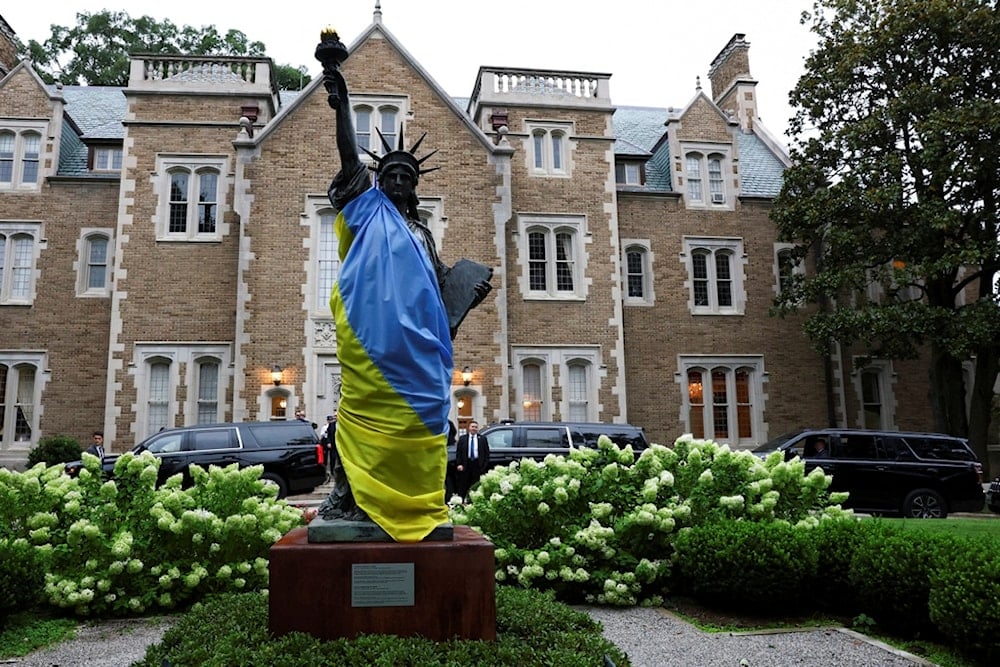Ukrainians in US fall into legal limbo as renewals stall under Trump
Tens of thousands of Ukrainians admitted to the US under a wartime humanitarian parole program are now losing legal status, work permits, and basic protections due to prolonged renewal delays under the Trump administration.
-

A scaled model of the Statue of Liberty stands draped in a Ukrainian flag in the gardens of the French Embassy in Washington, on Monday, August 18, 2025. (Yves Herman/Pool via AP)
Reuters on Sunday reports that tens of thousands of Ukrainians who arrived in the United States under a wartime humanitarian program are now facing the loss of legal status, work authorization, and basic protections due to prolonged processing delays under the Trump administration.
For Kateryna Golizdra, 35, the uncertainty has stretched on for half a year. After her status expired in May, she instantly became vulnerable to deportation, lost her job as a manager at the Ritz-Carlton in Fort Lauderdale, and could no longer access the health insurance she relied on to monitor a liver condition. She also stopped sending financial support to her mother in Germany.
The months since, she said, have felt like being stuck in a loop. "It’s a constant stress, anxiety," she said. "If I will need to leave the States, then I will have to build something again."
Parole crisis
The humanitarian parole program, launched in 2022 to offer temporary refuge to Ukrainians fleeing the war, admitted nearly 260,000 people for two years. But as renewals came due, the government paused processing in January, citing security reviews. Internal data reviewed by Reuters indicates that as of March 31, almost 200,000 Ukrainians were at risk of falling out of status, a figure not previously made public. Many told Reuters they were now deeply anxious about encounters with US immigration authorities or avoiding going outdoors altogether.
Although a federal judge ordered the administration to resume processing renewals in May, progress has been sluggish. Government filings in ongoing litigation show that only 1,900 renewal applications, covering Ukrainians and several other groups, have been completed since then. Compounding the issue, a spending bill signed in July added an extra $1,000 to the cost of each application, on top of the existing $1,325 fee.
Families stranded
Among those feeling the strain are tech professionals, teachers, designers, students, and families who say the loss of work permits has pushed them to exhaust savings, borrow money, or seek help from local communities. Some worry that remaining in the US without legal status could jeopardize any future attempt to return, leaving them in limbo abroad. A number have already departed for Canada, Europe, or Latin America.
US Representative Mike Quigley said his office has been contacted by more than 200 Ukrainians navigating the paperwork delays. "There's a fear that if they haven't completed their application, if they haven't gone through the whole process, they're vulnerable for deportation," he said.
Rising Detentions
Advocates say detentions are already occurring. Anne Smith of the Ukraine Immigration Task Force told Reuters that lawyers in her network are hearing multiple reports each week of Ukrainians being taken into custody, including during workplace enforcement actions. She described arrests involving drivers for Uber and delivery services, construction workers, and broader sweeps in Chicago and Cleveland.
Sponsors also say the slowdown has upended the lives of families who had done everything required of them. Brian Snyder, who has hosted three Ukrainian families in North Carolina, said one woman recently asked him to serve as her emergency contact in case she was detained. "All of this dysfunction and uncertainty is just introducing a tremendous amount of stress in these families’ lives," he said.
Forced choices
The pressure has pushed some to consider leaving the US voluntarily. Reuters spoke with several Ukrainians who attempted to "self deport" using the CBP One mobile app, which the administration has promoted by offering a free plane ticket and a $1,000 "exit bonus." But some found they were unable to choose destinations other than Ukraine, a red line for many who fear returning to the war.
One software engineer from Brooklyn, who entered the US in 2023, said he applied to renew his parole months before it expired but received no decision. When he attempted to use CBP One to fly to Argentina, where living costs are more manageable and a humanitarian entry pathway exists, the app would only permit travel to Ukraine. "If I return to Ukraine, I’ll just go to the frontline," he told Reuters. "I’d rather be homeless somewhere than go to Ukraine."
Read more: From detention to the frontlines: Ukrainians in US face deportation

 4 Min Read
4 Min Read








